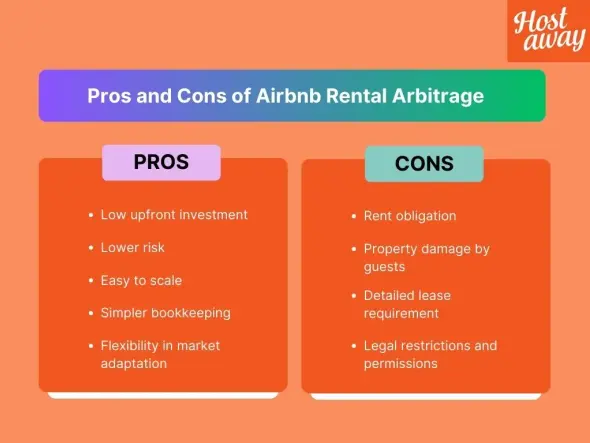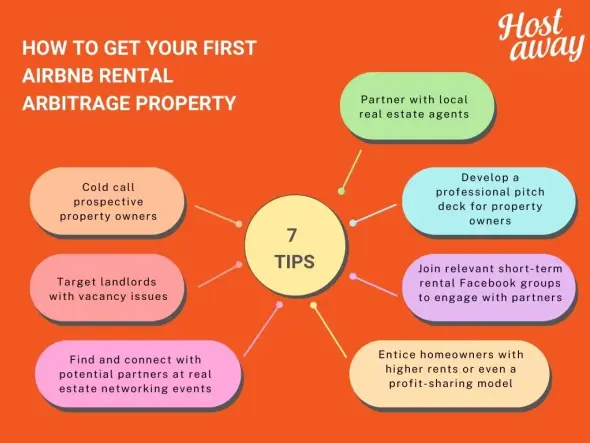What Is Airbnb Rental Arbitrage?

Key Takeaways:
Airbnb rental arbitrage is a strategy where you lease a property long-term, then sublet it as a short-term rental on platforms like Airbnb and Vrbo without owning the asset.
When done in the right market with strong demand, rental arbitrage can deliver high ROI, as long as your revenue comfortably exceeds rent, setup costs and operating expenses.
Legality depends on local short-term rental regulations, lease agreements and HOA rules, so you must secure landlord approval and confirm compliance before starting.
The model offers big advantages like low upfront investment, lower maintenance responsibilities, scalability and flexible market exit, but comes with risks such as fixed rent obligations, potential property damage and legal complexity.
Alternatives like buy and hold, commission-based property management, co-hosting and lease-to-own can also generate vacation rental income, and tools like Hostaway help you manage and scale whichever model you choose.
Airbnb rental arbitrage refers to renting a property on a long-term lease and then subletting it to a host of short-term renters, usually by listing the property on vacation rental platforms like Airbnb, Vrbo and others.
In the dynamic world of real estate and vacation rentals, this short-term rental strategy has emerged as a strategic approach that allows entrepreneurs to generate substantial income without the need to own property.

How Does Rental Arbitrage Work for Short-Term Rentals?
Airbnb rental arbitrage is a strategy that focuses on leveraging other people’s properties through sub-lease agreements and renting those properties on vacation rental booking platforms.
Hosts rent properties from the traditional rental market and resell them on the short-term marketplace. This approach is particularly effective when combined with vacation rental software which simplifies the management of multiple properties, streamlines booking processes and enhances guest experience.
Short-term rental leasing is an age-old strategy that transcends almost every industry in the world. In theory, it is very simple: Buy ‘Product A’, turn it into ‘Product B’, then sell that product at a higher price.
In recent years, this business model has gained popularity in the Airbnb and vacation rental community as an easier and low-cost way to enter the vacation rental industry.
What is an example of rental arbitrage?
For instance, a vacation rental host and tenant might sign a 28-month lease on a four-bedroom home, furnish it to suit vacation rental guests and then list it on Vrbo in order to generate rental income that surpasses their monthly rent.
They could list the entire home as a single unit on their booking platform, or live in the leased property and only rent out the remaining three rooms to short-term rental guests.
Is rental arbitrage legal?
Local laws about short-term rentals and allowing lease-to-rent businesses change by country, state, county and even cities. Many property owners may also outright ban this practice in their leases.
Research local laws or consult a legal professional or other expert about the legality of rental arbitrage in the area you are interested in, as well as existing disputes about practicing Airbnb rental arbitrage in the property location.
Does Airbnb allow rental arbitrage?
Yes. According to its terms and conditions, Airbnb does not mention or prohibit rental arbitrage, nor has it ever taken any action or mentioned taking action to prohibit rental arbitrage business on its platform. Plus, many Airbnb hosts practice rental arbitrage.
The platform does insist that vacation rental hosts comply with all local laws and regulations that apply to their operation. This can often mean obtaining written permission from the landlord of your long-term lease and additional registration in some cities.
If your township does not apply additional laws regards renting properties for arbitrage, it is always advisable to take the cautious approach and make sure it is included in your long-term lease agreement.
In what U.S. states is Airbnb rental arbitrage legal?
Yes, short-term rental arbitrage is legal through all 50 states of the U.S. However, several major cities have either banned or restricted short-term rentals. For example, some cities do permit rental arbitrage in rent-controlled apartments and other subsidized housing.

Is Airbnb rental arbitrage profitable?
If the vacation rental host is making more profit than the combined total of their rent and other short-term rental related expenses, they are technically profitable.
Rental arbitrage however can be highly lucrative, yielding higher returns on investment than traditional rental models.
Airbnb rental arbitrage profitability depends on your ability to attract bookings and raise rates. These in turn depend on factors like location, season and the guest experience you provide. Thorough market research is crucial to success as is effective rental property management.
Do you need an LLC for Airbnb arbitrage?
The short answer is ‘no’. But rental hosts, whether they are following the Airbnb arbitrage model or otherwise, may want to consider starting an LLC as it can protect their personal assets during lawsuits.
Is rental arbitrage a good idea?
Rental arbitration is a compelling entry point into the short-term rental market.
It requires minimal upfront expenses and allows investors to gain exposure to the lucrative hospitality market without purchasing property. Many beginners in the vacation rental business find that Airbnb rental arbitrage is an effective way to generate significant profit and build capital quickly for future investments.
What are the Advantages of Airbnb Rental Arbitrage?
Operating an Airbnb rental arbitrage business offers numerous advantages.
The business model has also been stress-tested by leading Airbnb hosts from around the world. For example, Sean Rakidzich, a highly successful Airbnb operator, Youtuber and businessman, scaled his portfolio from zero to over a hundred units using nothing else but the rental arbitrage business model.
Rental income arbitrage provides several key benefits including:
1. Low upfront investment
Since you're not buying the property, you don’t need to pay a hefty down payment. All you need to do is pay your first month's rent and damage deposit and buy any furniture, appliances, linens, toiletries, etc needed to get your property Airbnb ready.
2. Lower risk
As a rental arbitrage host, you aren’t responsible for major maintenance issues like roof repairs. Those fall under the landlord’s purview.
3. Scalability
In order for your business to succeed, it needs to be scalable and rental arbitrage allows for that.
With an all-in-one vacation rental software like Hostaway that includes property management, channel management, guest communications, direct booking and dynamic pricing features, you can scale your rental arbitrage business to manage multiple properties even in multiple locations.
4. Simplified bookkeeping
Landlords have to manage and pay multiple expenses such as HOA fees, mortgage, utilities, maintenance, etc. But the rental arbitrage host only has to pay one flat fee to the landlord each month — rent — apart from vacation rental operational costs.
5. Flexibility in market adaptation
With rental arbitrage, you’re not tied down to a property as you would be with property ownership. If the market dynamics change, or if demand shifts, you can end your long-term lease after its term and move on to a different property or location that better meets your profitability goals.
This flexibility allows you to test different locations, revenue strategies and vacation rental platforms with less risk than owning property in a declining market.
These benefits make rental arbitrage an appealing model for building a short-term rental business quickly and efficiently.

What are the Disadvantages of Airbnb Rental Arbitrage?
Any business model has its pros and cons and while rental arbitrage can be profitable, it comes with its own set of challenges.
Here are some disadvantages of rental arbitrage:
1. Rent obligation
Regardless of whether you got bookings or not, you have to pay your rent each month. Late payments can lead to penalties, eviction or lawsuits, making rental arbitrage a financial risk if you let occupancy rates drop.
2. Property damage
If a guest damages the rental property, whether by accident or on purpose, the rental arbitrage host is responsible for repairs.
Short-term rental insurance and taking a security deposit can mitigate costs but it’s always better to screen your short-term rental guests to avoid troublemakers altogether.
3. Leasehold agreements
You will need to write out a detailed lease agreement with your landlord to ensure that you, the landlord and your guests are all protected. These documents can be time-consuming and costly to have created, often requiring professional legal assistance.
4. Legal restrictions and permissions
You will need to understand the local laws, HOA bylaws and in some cases even receive permission from your Airbnb neighbors to operate a short-term rental.
Many cities, states and HOA councils do not want Airbnb vacation rentals opening up everywhere so often there are strict rules in place to limit where and how short- and long-term lease rentals can operate.
Research local regulations carefully to avoid conflicts or fines.
How to Calculate Airbnb Rental Arbitrage ROI in Your Short-Term Rental Business
At the end of the day, you're in the short-term rental arbitrage business to make more money than you invested.
The potential Return on Investment (ROI) of rental arbitration can be substantial depending on the property, location, market demand, expenses and your short-term rental entrepreneurial skills.
To calculate Airbnb rental arbitrage ROI, use the following formula:
ROI = (Cost of Investment / Net Return on Investment) X 100%
For example, let’s break down a typical rental arbitrage deal:
Start-up costs
Expense | Cost |
First Month’s Rent | $1,000 |
Damage Deposit | $500 |
Furniture | $2,500 |
Decor | $1,000 |
Total | $5,000 |
Annual operating expenses
Expense | Cost |
Rent | $12,000 |
Cleaners Pay | $4,500 |
Utilities | $3,600 |
Maintenance | $1,200 |
Licenses / Permits | $300 |
Total | $21,600 |
|
Annual revenue
Revenue | |
Bookings | $22,000 |
Cleaning Fees | $4,500 |
Total | $26,500 |
Annual Net Profit/Net Return on Investment = Annual Revenue - Annual Operating Costs = $26,500 - $21,600 = $4,900
ROI = (Net Profit / Start-Up Costs) x 100
Annual ROI = (Start-up Costs / Annual Profit) X 100% = ($5,000 / $4,900) X 100% = 98%
This example demonstrates that Airbnb rental arbitrage can deliver high ROI in the right markets.
How to Get Your First Airbnb Rental Arbitrage Property
Starting a rental arbitrage business can be challenging without the right strategy.
Here are some tips to help you get started on your rental arbitrage journey:
Create a professional rental arbitrage proposal
Develop a clear, concise and compelling pitch deck that explains the benefits to property owners. Include information about how you plan to manage the property, your experience with vacation rental booking platforms and how the homeowner will benefit from a higher rent or share of the profits.
Join relevant Facebook groups
Engage with local investors and property owners on dedicated Facebook groups and let them know how you can make them make more money.
Build a website
Promote your services on a website.
A professional rental arbitrage website builds credibility and with SEO optimization, can attract property owners interested in rental arbitrage partnerships.
Offer a higher rent or profit-sharing
To convince a property owner to allow rental arbitrage, offer them a higher rent than they would receive from a regular tenant. You can also offer a share of the profits as a greater incentive.
Network at real estate events
Every city has a real estate networking event. Drop by regularly and connect with potential partners.
Cold call
Cold-calling landlords can still be an effective way to find rental arbitrage properties. Pick up the phone and start dialing prospective landlords and ask them if they're interested in subletting their property to you to list on Airbnb.
Target landlords with vacancy issues
Look for property owners who have had vacant units for extended periods. Landlords struggling to fill these vacancies may be more open to the idea of rental arbitrage if it ensures consistent and higher rental income.
Partner with local estate agents
Establish relationships with real estate agents who specialize in rentals. These agents may know landlords with vacant units or those willing to lease to someone involved in Airbnb rental arbitrage. They can also put in a good word for you with property owners.

Alternatives to Airbnb Rental Arbitrage
Rental arbitrage is a popular strategy that works but it’s not a good fit for everyone. There are ways to make money in the vacation rental industry.
Here are some alternatives to rental arbitrage in the vacation rental market:
1. Buy-and-hold strategy
This traditional short-term rental business model involves purchasing a property with the intent to hold it for long-term rental income and appreciation. It is the strategy most real estate investors adopt.
Appreciation
Historically, real estate prices rise. As a result, the value of your equity in the property also increases over time.
Debt paydown
As you work to pay off the mortgage, the principal payments will slowly grow your wealth, month-after-month.
Tax deductions
There are huge tax benefits to owning real estate, especially rental real estate. Consult with your tax accountant about what tax advantages are available to you.
More control
Since you own the real estate, you have more control over your business. You'll never have to worry about being evicted because you're in complete control of your asset.
2. Commission model
A less commonly used model, it provides some of the benefits of buy-and-hold and some of the benefits of vacation rental market and arbitrage.
In the commission model you partner with a homeowner to manage their property as a short-term rental and splitting the revenue and/or profit. Homeowners have the up-side benefit of listing their property on OTAs while also making use of it from time-to-time. Companies like Vacasa also use this model and have thousands of properties across North America.
Little to no risk
The homeowner is responsible for the cost of maintaining the property, paying all homeowner expenses, the insurance policy and any up-front setup costs.
Immediate cash flow
Since you take a commission from the revenue, you immediately get paid each and every time you make a booking.
Listing control
The homeowner does not own the online listing, so if they choose to fire you from managing their property, they do NOT get to keep their property's online listings. In other words, they would have to start from the beginning again.
Lesser profit
Your income depends on a percentage split, which may be lower than what you could earn through rental arbitrage. And if the property owner ends the partnership, you lose the listing.

3. The co-host model
This allows you to partner with an already established Airbnb property and host. Many hosts do not have the time or resources to manage the property themselves so they hire co-hosts to assist them with the property.
This is similar to the commission model in terms of how you get paid, but you're acting underneath the homeowner, rather than acting for the homeowner.
Little to no risk
Similar to the commission model, the homeowner is responsible for setting up and maintaining the property.
Immediate cash flow
This depends on the agreement between you and the homeowner, but typically you get paid each and every month.
4. Lease-to-own
The lease-to-own model, also known as rent-to-own, allows you to lease a property with the option to buy it later. This approach lets you test the property’s profitability while building towards ownership.
Profitable trial
This strategy allows you to build rental income as you save toward a purchase, giving you a chance to assess the property’s long-term potential.
Higher costs
Often this comes with higher lease payments and upfront option fees. Additionally, if the property does not perform well, you may lose the option fees without gaining ownership.
Each of these models provides an alternative way to enter the short-term rental market and earn rental income without fully committing to Airbnb rental arbitrage. Choose the approach that aligns best with your financial goals, investment capacity and business objectives.
Is Airbnb Rental Arbitrage Your Next Big Move?
Airbnb rental arbitrage offers a unique and accessible entry into the short-term rental industry, enabling aspiring entrepreneurs to earn substantial income without the financial burden of purchasing property. By leveraging an all-in-one vacation rental software like Hostaway and maximizing demand for short-term rentals, this model can provide flexibility, scalability and impressive returns without the high risks of outright property purchases.
But Airbnb rental arbitrage is not without its challenges. From securing landlord approval to navigating complex local laws and market research, success in this field demands diligent planning, effective management, and an in-depth understanding of the market. Additionally, hosts need to be prepared to handle increased risk associated with managing high-turnover properties and ensuring constant guest satisfaction.
If you are ready to embrace the challenges, Airbnb rental arbitrage presents a path to entrepreneurial success and financial independence in the growing short-term rental industry.
Ready to find out how Hostaway can transform your business?
